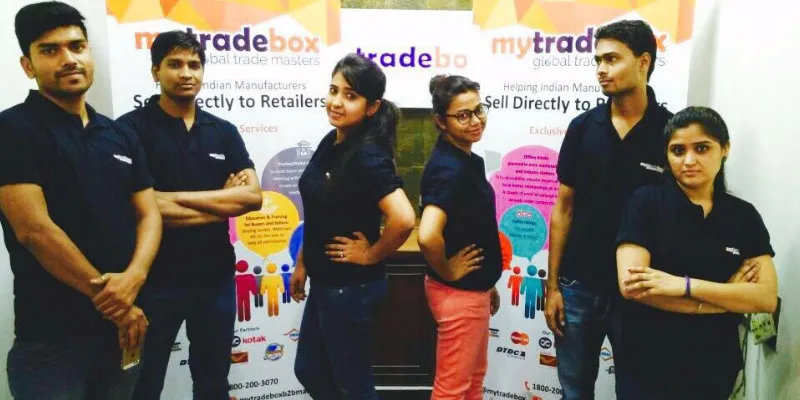How this 47-yr-old entrepreneur built a marketplace catering to 900 SMEs, 2,500 retailers and 120,000 pincodes
Jayant Mehrotra brings with him more than 20 years of experience in financial markets, with widespread knowledge and considerable skill in accounting, business management, networking and negotiation. Being in the capital markets for so many years, Jayant noticed that SMEs were still battling with Chinese imports, leaving domestic industry in crisis.

He then thought that if SMEs were to get more exposure and a transparent mechanism of payment, they could reduce intermediaries and increase margins. Simultaneously, it would also counter the infiltration of low quality Chinese products.
To battle against all odds affecting the scalability of SMEs, Jayant took a step forward and came up with the idea of mytradebox in November 2015 in Delhi.
mytradebox is a bootstrapped company with a seed capital of Rs 70 lakh. Hailing from a non-technical background, we faced many challenges. People misguided us for their monetary benefit. We lost around 18 months before we finally launched My Trade Box,” says Jayant (47).
Assisting SMEs
An online hybrid assisted bulk-buying marketplace, mytradebox, with its physical presence in local markets, gives SMEs easy access to local retailers and buyers. The platform caters to both the B2B and B2C segments with its online and offline presence (through manned kiosks).
In their B2C model, they sell products in the lighting, office stationary, sanitary ware and other categories. And in their B2B model, they reach out to small manufacturers, enabling them to have an online presence and list their products.
mytradebox is fundamentally bridging the gap between manufacturers, retailers and SMEs in tier II and III cities. It further aspires to enable technology in the remotest of villages through two physically manned kiosks. Every kiosk will have three men- one head and two field assistants, with one team in each district.
The startup, at present, is catering to Haryana, Punjab, Himachal Pradesh, Rajasthan and UP, covering, in all, 62 districts.
With an exclusive tie-up with India Post, the startup managed to have access to over 120,000 pincodes. Its partnership with Kotak Mahindra Bank (with an ESCROW feature) will process the large number of transactions. The bank works with a Nodal/ Escrow account, which receives the payment against order id and notifies the supplier through a set mechanism and releases the payment after being informed about the completion of the transaction.
mytradebox empowers SMEs with its 24x7 availability in dealing with orders, execution, paperwork and product finding. Its on-field sales experts also provide handholding on making smart bulk purchases.
It also helps retailers make better purchase decisions by using mytradebox’s useful tools for price negotiation, advance payments, generating purchase orders, and due diligence of sellers by premier rating agencies SMERA and KPMG. Additional features available for retailers include flash sales, group buying, trade manager/notifications and more.
mytradebox has 50 kiosks in North India serving over 2,500 retailers, and it aims to have at least 10,000 small manufacturers doing business with one lakh retailers in the next two to three months.

Scalability
The team of My Trade Box, before onboarding retailers, educates them about the costs, benefits and convenience of making secured payments through an Escrow A/C. Similarly, SMEs are educated about the services being offered by mytradebox.
The startup currently has more than 900 SMEs and around 2,500 retailers on board. Its tie up with Lendingkart will provide loans to SMEs worth anywhere between Rs 50,000 and Rs 1 crore. According to Jayant, since B2B is a high volume and low margin business, mytradebox will get a transaction fee of one percent on every transaction done through its platform.
The B2C version of the website, which went live in January this year, witnesses 100 orders per day, with an average ticket size of Rs 1,000. Currently, mytradebox has a team of 20 employees and is planning to set warehouses in South and West India by the end of this year.
The startup is also launching an app by the name of Flash Sales. The app will allow SMEs to upload surplus inventory, and the notification will be pushed to only retailers registered in the same category. This will help both of them discover the optimum price.
Market Opportunity
The Ministry of Micro, Small and Medium Enterprises reported that there are 36 million small units in India. Most of them are buyers and sellers of various industrial goods contributing to the growth of B2B e-commerce. According to consultant firm Ecumen.in, the B2B segment in India is set to grow by 2.5 times and expected to touch Rs 45 lakh crore by 2020.
To address the growth of this market, a few startups have emerged in the past few years. Delhi-based Industrybuying.com is an online marketplace selling industrial products to SMEs as well as large businesses. In January, it raised Rs 12 crore. Bengaluru-based StoreKing, leveraging the power of the vernacular, has introduced more than one million villagers to the world of online shopping. Gurgaon-based Power2SME is an online buying platform that caters to manufacturers for the supply of steel, chemicals and polymers.
Website: mytradebox







